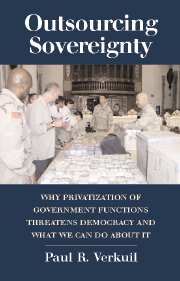 Outsourcing Sovereignty
Outsourcing Sovereignty Book contents
- Frontmatter
- Contents
- Acknowledgments
- Chart
- 1 Introduction and Overview – Why Outsourcing Threatens Democracy
- 2 The Outsourcing of Sovereignty
- 3 Case Study: Public and Private Approaches to Transportation Security
- 4 The Public-Private Distinction
- 5 The Case for Constitutional Governance
- 6 Statutory and Administrative Limitations on Private Delegations
- 7 Outsourcing Government Services: Contract Theory and Practice
- 8 Structural Reforms to Government
- 9 Conclusions (Wherein the Principal Instructs Her Agents)
- Cases
- Bibliography
- Index
7 - Outsourcing Government Services: Contract Theory and Practice
Published online by Cambridge University Press: 27 July 2009
- Frontmatter
- Contents
- Acknowledgments
- Chart
- 1 Introduction and Overview – Why Outsourcing Threatens Democracy
- 2 The Outsourcing of Sovereignty
- 3 Case Study: Public and Private Approaches to Transportation Security
- 4 The Public-Private Distinction
- 5 The Case for Constitutional Governance
- 6 Statutory and Administrative Limitations on Private Delegations
- 7 Outsourcing Government Services: Contract Theory and Practice
- 8 Structural Reforms to Government
- 9 Conclusions (Wherein the Principal Instructs Her Agents)
- Cases
- Bibliography
- Index
Summary
Given the necessity and inevitability of outsourcing, a better understanding of government contracting is essential to overcoming the crisis of public control. A recent congressional report sets out the scope of the outsourcing problem. During the period FY 2000 to FY 2005, the value of federal contracts increased by 86 percent (from $203 billion to $377 billion) and the value of noncompetitive contracts increased by 115 percent (from $67 to $145 billion). The largest contractors received over 20 percent of these contracts and Halliburton's totals increased by 600 percent. Iraq is undoubtedly a principal cause of these increases in the growth of noncompetitive contracts, but government has also been turning more generally to contractors during this five-year period.
This chapter approaches the contract problems inherent in private delegations by comparing contract theory with constitutional theory. It then utilizes agency cost theory to explain the current contracting out process at key agencies such as the DOD and the DHS. Sole sourcing has become a significant accountability issue. Government often relies on competition as a defense against inappropriate contracting. Rampant sole sourcing compromises the process. But even when contracts are competitively bid, the shortage of contract personnel to oversee the contracts that are awarded is itself an accountability concern.
A CONTRACTARIAN APPROACH TO DELEGATION OF PUBLIC AUTHORITY TO PRIVATE HANDS: CARTER COAL MEETS BOSTON ICE
Contract theory underpins both public and private law.
- Type
- Chapter
- Information
- Outsourcing SovereigntyWhy Privatization of Government Functions Threatens Democracy and What We Can Do about It, pp. 140 - 157Publisher: Cambridge University PressPrint publication year: 2007


